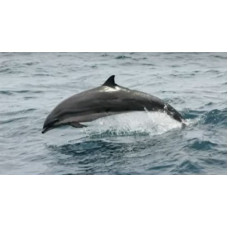Latin name
Lagenodelphis hosei
Other names
Sarawak dolphin
Identification
The skull is similar to that of the common dolphin and Lagenorhynchus. They have a stocky build. A distinctive feature of this dolphin is the absence of a protruding beak.
Features of fish fins
Have a small dorsal fin in relation to body size and conspicuously small other fins.
Fish colouring
A broad gray-yellow band runs from the eyes to the genitals.
Distribution
They live in the tropics and subtropics of the Atlantic, Pacific and Indian Oceans. In summer, they reach Japan (Kamogawa) with the Kuroshio current; they have been found in Taiwan, Polynesia (Rawaki Island), near Sydney (Australia), and in southern Africa (Durban).
Habitat
Dolphins are usually seen in deep tropical waters between 30°S and 20°N. The Eastern Pacific is the best place to see them.
Size
At birth, they are about 1 m (3 ft 3 in) long and weigh 20 kg (44 lb), growing to 2.75 m (9 ft 0 in) and 200 kg (440 lb) by adulthood.
Behavior
They swim in schools of up to 400-500. They swim fast and powerfully through the water.
Food and feeding habits
This species feeds on pelagic fish, squid, and shrimp at some distance from the surface (200 m/660 ft to 500 m/1600 ft). Sunlight has little or no penetration at this depth, so feeding is by echolocation only.
Reproduction
These dolphins have the smallest genitalia of any dolphin on the high seas. Both sexes reach sexual maturity at about seven years of age, although females may reach maturity a little earlier. They are polygamous. Mothers may give birth every two years. Mating seems to occur during the summer months. The gestation period is 10 to 12.5 months, after which the female gives birth in the spring or summer to a single calf about 1 meter long.
The average life span of this dolphin is about 16 or 17 years.
Fishing
Constantly at risk of bycatch. In the eastern Pacific, this dolphin is often caught in tuna fishing nets.
Relationship with a person
These dolphins are captured to use their meat as bait for other species.
| Classification | |
| Phylum | Chordata |
| Class | Mammalia |
| Squad | Artiodactyla |
| Family | Delphinidae |
| Genus | Lagenodelphis |
| Species | L. hosei |
| Features | |
| Conservation status | Least Concern |
| Habitat | Pelagic |
| Life span, years | 17 |
| Maximum body weight, kg | 200 |
| Maximum length, cm | 275 |
| Sailing speed, m/s | No information |
| Threat to people | Edible |
| Way of eating | Predator |
Fraser's dolphin
Tags: frasers dolphin


